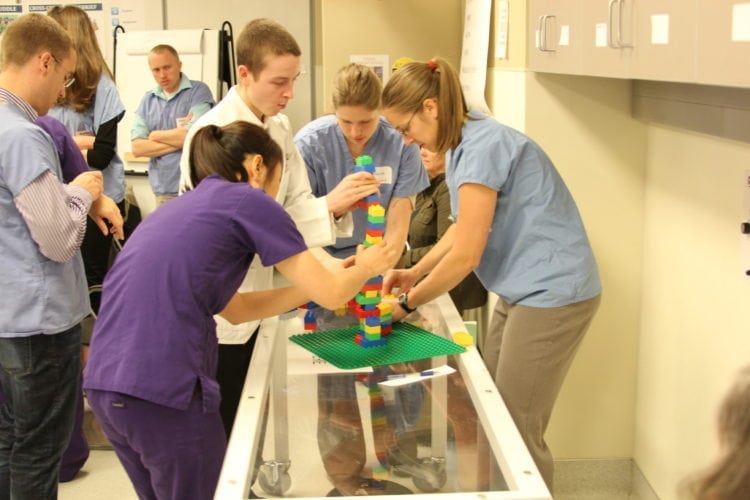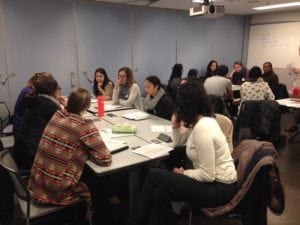
UW School of Pharmacy students are among few who are educated side by side with several other health professionals including faculty and students in medicine, nursing, dentistry, physician assistants, physical therapy, occupational therapy, social work and public health. 
IPE is integrated into the PharmD curriculum to ensure a seamless learning journey encompassing skills, experiential learning, and simulations. This offers UW PharmD students a distinctive chance, within an academic medical center, to train alongside a diverse array of health professional colleagues crucial for their roles as pharmacists. Our students engage and collaborate with students from various disciplines such as medicine, nursing, dentistry, public health, social work, physician assistant, dietetics, health administration, and physical therapy.
During experiential education, students interact with other health professionals in practice sessions known as Wednesdays in Practice (WIP) during the first two years and advanced pharmacy practice experiences (APPEs) during the latter two years. Alongside IPE activities, many opportunities exist for students to connect with peers in other health professions through community engagement activities.
PY1
The Pharmacist Provider Series includes a consistent curricular theme (Collaborative Team Member, CTM) in which activities to support development of interprofessional teamwork skills are required. Students are also exposed to other health professionals in early and introductory practice experiences.
IPE Activities in PY1
- Participate in the IPE Core Curriculum, which is coordinated by the UW Center for Health Sciences Interprofessional Education (CHSIE), Research, and Practice with representatives from all six health science schools. This 3-part curriculum focuses on small group interaction and engagement with skilled IPE facilitators.
- Participate in a TeamSTEPPS workshop to learn introductory communication and teamwork skills to optimize patient outcomes
- Practice verbal communication to team members using TeamSTEPPS tools
- Actively observe another healthcare team member interacting with a patient
Students may also choose opportunities for community engagement that involve students from other health professions.
PY2
The CTM curricular theme continues in the Pharmacist Provider Series to include the following:
IPE Activities in PY2
- Practice written communication to team members through writing SOAP notes, a problem-oriented communication used in health care
- Deliver patient presentations and collaborate on care with a standardized team member
- Communicate with another team member regarding a patient to provide coordinated care (e.g. SBAR, clinical consult)
- Communicate and collaborate with dietetics students to educate patients on the plate method, demonstrate blood glucose monitoring, and develop a plan for a patient with diabetes.
PY3
In their third year, our students participate in a high-fidelity health care simulation with medical students. 
Across these learning experiences our students meet with faculty and other mentors to be coached in team performance and discuss general professional development.
PY4
In their fourth year, our students complete at least two (of eight) Advanced Pharmacy Practice Experiences (APPEs) that include team collaboration as a required competency:
- Acute Care General Medicine (PHRMPR 563)
- Ambulatory Care Clinic Pharmacy (PHRMPR 562)
They also are required to obtain one peer-evaluation of their performance from a colleague outside of pharmacy.
Additional Information
Students have many other opportunities to get involved with other health professions through multiple certificate programs and electives. The Student Portal includes further details about these opportunities.